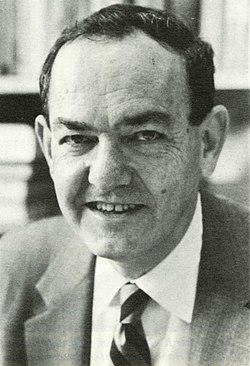Хърбърт Саймън
За информацията в тази статия или раздел не са посочени източници. Въпросната информация може да е непълна, неточна или изцяло невярна. Имайте предвид, че това може да стане причина за изтриването на цялата статия или раздел. |
| Хърбърт Саймън Herbert Simon | |
| американски икономист | |
 | |
| Роден | |
|---|---|
| Починал | 9 февруари 2001 г.
Питсбърг, САЩ |
| Религия | атеизъм |
| Националност | |
| Учил в | Чикагски университет |
| Научна дейност | |
| Област | Изкуствен интелект, когнитивна психология, компютърни науки, икономика, политология |
| Работил в | Университет „Карнеги Мелън“ Калифорнийски университет, Бъркли Илинойски технически институт |
| Награди | Награда Тюринг (1975); Американски национален медал за наука (1986); Награда фон Нюман (1988) |
| Хърбърт Саймън в Общомедия | |
Хърбърт Саймън (на английски: Herbert A. Simon) е американски икономист и психолог. Удостоен е с Нобелова награда за икономика през 1978 г. „за пионерни изследвания на процеса на вземане на решения в икономическите организации“.
Биография
[редактиране | редактиране на кода]Роден е на 15 юни 1916 година в Милуоки, САЩ, в семейство на евреи. Като дете учи в държавно училище в Милуоки. През 1933 се записва да учи в Чикагския университет, където следва хуманитарни науки и математика.
От 1939 до 1942 оглавява отдела за научни изследвания на Калифорнийския университет в Бъркли.
Приносите му в икономиката са свързани главно с вземане на решения на мениджърско (управленско) ниво. Той разглежда решението като йерархия от различни степени. От тези му изследвания става ясно, че е невъзможно решенията да се вземат с пълна достоверност. За тази своя теория получава Нобелова награда за икономика през 1978.
Умира на 9 февруари 2001 година в Питсбърг на 84-годишна възраст.
Библиография
[редактиране | редактиране на кода]
- 1947, Administrative Behavior: A Study of Decision-Making Processes in Administrative Organizations
- – 4th ed. in 1997, The Free Press
- 1956, „Reply: Surrogates for Uncertain Decision Problems“.
- – Reprinted in 1982, In: H.A. Simon, Models of Bounded Rationality, Volume 1, Economic Analysis and Public Policy, Cambridge, Mass., MIT Press, 235 – 44
- 1957. Models of Man. John Wiley. Presents mathematical models of human behaviour.
- 1958, (with James G. March and the collaboration of Harold Guetzkow). Organizations. New York: Wiley.
- 1967, „Motivational and emotional controls of cognition“, Psychological Review, vol. 74:29 – 39, reprinted in Models of Thought Vol 1.
- 1969, The Sciences of the Artificial. MIT Press, Cambridge, Mass, 1st edition
- 1972, (with Allen Newell). Human Problem Solving.
- 1972, „Theories of Bounded Rationality“. In: C.B. McGuire and ROY Radner teds. 1, Decision and Organization, North-Holland Publishing Company, 161 – 76
- 1977, Models of Discovery: and other topics in the methods of science. Dordrecht, Holland: Reidel.
- 1979, Models of Thought, Vols. 1 and 2. Yale University Press. His papers on human information-processing and problem-solving.
- 1982, Models of Bounded Rationality, Vols. 1 and 2. MIT Press. His papers on economics.
- 1983, Reason in Human Affairs, Stanford University Press. A readable 115pp. book on human decision-making and information processing, based on lectures he gave at Stanford in 1982. A popular presentation of his technical work.
- 1991, Models of My Life. Basic Books, Sloan Foundation Series. His autobiography.
- 1996, The Sciences of the Artificial, 3rd ed. MIT Press.
- 1987, (with P. Langley, G. Bradshaw, and J. Zytkow). Scientific Discovery: computational explorations of the creative processes. MIT Press.
- 1997, An Empirically Based Microeconomics. Cambridge University Press. A compact and readable summary of his criticisms of conventional „axiomatic“ microeconomics, based on a lecture series.
- 1997, Models of Bounded Rationality, Vol. 3. MIT Press.
- Courtois, P.J., 1977, Decomposability: queueing and computer system applications. New York: Academic Press.
| |||||
|
- Американски психолози
- Американски социолози
- Американски икономисти
- Иконометрия
- Микроикономика
- Носители на Нобелова награда за икономика
- Американски нобелови лауреати
- Възпитаници на Чикагския университет
- Университет „Карнеги Мелън“
- Преподаватели в Калифорнийския университет – Бъркли
- Членове на Националната академия на науките на САЩ
- Американски атеисти
- Личности (Милуоки)
- Американски информатици
- Изследователи в социалните науки
- Когнитивни психолози
- Починали в Питсбърг
